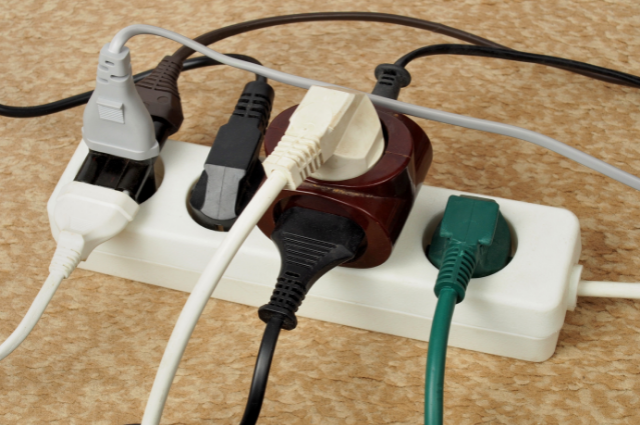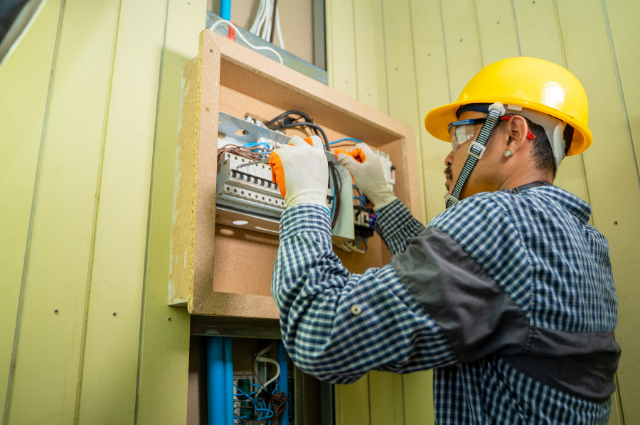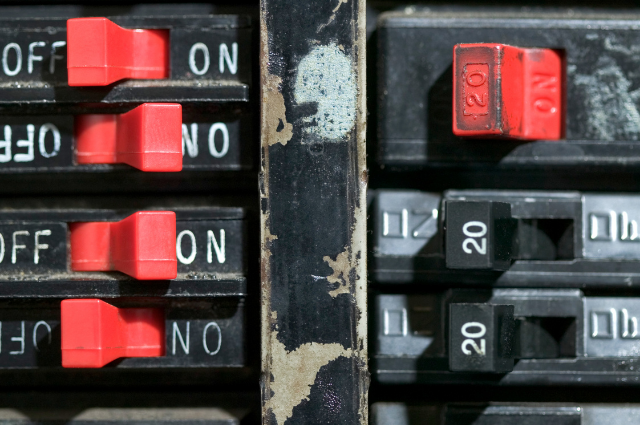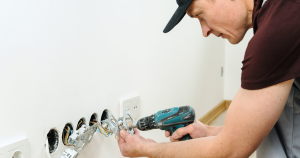The circuit breaker is an important safety mechanism of every home. It is working to keep you and your home safe.
Fires and mayhem would ensue with the lack of breakers, so even though it may be annoying when your circuit breaker trips repeatedly, finding a way to fix it is necessary.
Here is what you can do if your circuit breaker keeps tripping.
What Is a Circuit Breaker?
The electricity in the home is routed through a breaker or service panel, which houses individual circuits. All circuit breakers have an “ON/OFF” switch to indicate whether a circuit is currently active.
Different circuits are required for different regions of the home. If a single breaker was used for all the home’s electrical circuits, the breaker would trip continuously. To understand precisely how a circuit breaker works, it is essential to know how electricity works.
Voltage, resistance, and current are the three main properties of electricity. The voltage acts as the pressure in moving an electric charge through a conductor and the rate at which it moves is referred to as the current.
Resistance, on the other hand, occurs when a conductor interacts with the electric current. Various conductors provide varying resistance levels.
The electrical wiring loop in your home is typically composed of three types of cables: a neutral wire, a hot wire that conducts electricity, and a ground wire. Ordinarily, the neutral and hot wires never touch, and the current flows through a device that applies resistance to it to maintain the voltage at a safe level.
Should the neutral and live wires come into contact for any reason, the current does not receive as much resistance, causing the current and voltage levels to rise dangerously, known as a circuit overload, which could cause an electrical fire.
When this occurs, the breaker trips, blocking electrical power to the circuit until the problem is resolved.
Why Do Circuit Breakers Keep Tripping?
If a circuit breaker keeps tripping, it is usually an indication that something is amiss with the circuit.
- A short circuit in one of your appliances or somewhere in the wiring
- A ground fault
- Circuit overload
- The breaker box is failing
- The electrical panel needs replacement
- The breaker isn’t the right size for the current flowing through it.
Signs of a Faulty Circuit Breaker
- If the power goes out in a specific area of your home instead of the entire house
- If several electrical outlets at home are not working
- Look at the breaker box. Should the breaker be in the “OFF” position, it has tripped.
- There could also be a red light indicating a tripped breaker.
- Depending on your breaker, it could have moved just slightly, so you may need to take a closer look to determine which one has tripped.
How To Fix A Circuit Breaker That Keeps Tripping
Circuit breakers can trip for several reasons. Here are some of the most common things you can check at home when you notice your circuit breaker tripping.
1. Check for a Circuit Overload

As we have already seen, a circuit comprises a breaker, wiring, and the electric appliances that need to be powered. When each appliance is used, it adds to the total load on the electrical circuit.
However, when you attempt to use more electricity than the circuit has been designed for, there is an overload. When this occurs, the breaker trips, cutting off the power supply to that circuit.
Solution
Before resetting the breaker, unplug all appliances on the circuit to help identify the problem. Once the breaker has been reset and has rested for a while, plug-in appliances one at a time to see what caused the overloaded circuit.
If these circuit overloads occur regularly, you may need to add a new circuit and outlet for that particular region of the home to manage the high amperage load.
2. Check for a Short Circuit
When a neutral wire and a hot or live electrical wire come into contact, high current flows and overloads the circuit.
A short circuit causes a tripped circuit breaker; it could produce sparks, smoke, or a popping sound. It could also be caused by a slipped wire, loose or corroded wires, or damage to a cable. Cables can often become damaged by rodents who like to chew on them.
Solution
Several factors could cause a short circuit, including a faulty electrical switch or receptacle, a damaged fixture or electrical equipment, and faulty cord or plugs. Locating the short circuit isn’t often an easy task, and Assurance Electrical Services can help you with this.
Short circuits are potentially dangerous because the increased current flow generates high temperatures. This can result in a fire, so fixing the problem with no electrical expertise could be hazardous.
[Read: The Easy 5-Step Visual Guide to Electrical Fault Finding]
3. Check for a Ground Fault
When hot or live wires come into contact with ground wires, a grounded area of an appliance, or a grounded junction box component, a ground fault occurs.
If these wires make contact, and a ground fault occurs, a vast amount of current flows through the breaker, causing it to trip.
Solution
Ground Fault Circuit Interrupters (GFCI) are required for the protection of many areas of the home according to the National Electrical Code (NEC). A ground fault circuit interrupter is there to prevent electrical shocks and fires.
Ground faults typically occur when appliances are damaged, and they can be dangerous because live electrical parts could no longer be protected from unintentional contact.
[Related: 7 Home Wiring Safety Checks Homeowners Should Do Yearly]
Why You Need a Professional Electrician

According to the Occupational Safety and Health Administration (OSHA), you should never attempt to repair electrical cords or conduct any home electrical repairs without relevant training.
Caution is always advised when working with electricity. If you notice a constantly tripping breaker, it is always advisable to contact a professional electrician who has experience dealing with problems such as ground faults and short circuits.
[Read: 7 Signs That I Need To Hire Electrician Near Me]
Assurance Electrical Services Is Here to Help
When a circuit trips, it can be challenging to find the fault. At Assurance Electrical Services, we have more than two decades of experience with residential and commercial electrical services.
We serve our customers with the utmost care, accountability, and integrity, so you can have peace of mind when we deal with electrical malfunctions in your home.
Contact us today to get to the bottom of your electrical system problem promptly. We provide sound advice and expertise that you can trust.
Jeff Brandlin is the founder of Assurance Electrical Services, LLC. He started in the electrical industry when he was 21 and had worked in several electrical firms before founding Assurance Electrical. Jeff is dedicated to providing the best quality service to his clients and always puts their needs first. Outside work, Jeff enjoys spending time with his wife and children.





